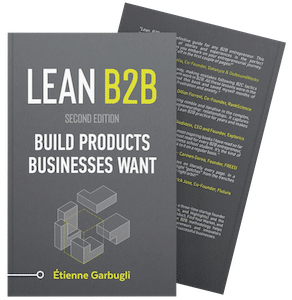Don’t put limits too early. Don’t close yourself off to new discoveries. – Martin Huard, Admetric Co-Founder and CEO
As you make progress with your startup, there are things you know, but there are many things you have yet to figure out. Although you’re putting together a solution to a real problem (I hope!), almost everything you’re working with is still hypothesis.
Your goal is to solidify the things you know into validated learning while leaving room for discovery, growth and serendipitous outcomes. Optimizing too early might mean missing out on a better business opportunity.
SOLUTION RULE
You shalt not fall in love with thy solution.
As you brainstorm with your team, ask yourself for every decision you make, “Do we know whether this is the right approach?” “How do we know this?”
You’ll call everything you don’t know a risk and formulate testable hypotheses around it.
Is your solution dependent on outside factors for success? Do you need access to some hard-to-find information to build your product? Will security be an issue?
Start Tracking Your Hypotheses – Get the Free Hypothesis Test Plan Template
Testable Hypotheses And the Lean Startup Methodology
The Lean Startup methodology is about validating hypotheses. As Eric Ries recommends in his book (The Lean Startup), a startup should start by validating the riskiest parts of its product and business model first.
You’ll create a test plan with specific and testable hypotheses that you’ll rank from high risk (can kill your solution) to low risk (improvement opportunity).
Because most people are visual, it’s much harder to get feedback on a feature or an idea if prospects have to imagine how it’s going to work. You need to put something concrete together for validation like a Minimum Viable Product (MVP).
Include your riskiest assumptions in this MVP. Moving forward, you’ll adjust your hypotheses and your product until it matches the needs of your prospects.
Start Tracking Your Hypotheses – Get the Free Hypothesis Test Plan Template
You can picture this process a little bit like a funnel where you gradually narrow down your definition of a solution until you reach Product-Market fit.
Let’s get started!
More on Testable Hypotheses
- The Importance of Lean Business Model Hypotheses in B2B Cust Dev
- The Importance of Lean Business Model Hypotheses in B2B Cust Dev
- B2B Consulting: Can Consulting Help You Build and Validate a Business Faster?
Download the First 4 Chapters Free
Learn the major differences between B2B and B2C customer development, how to think about business ideas, and how to assess a venture’s risk in this 70-page sampler.
Working on a B2B Startup?
Learn B2B customer development with our free email course:



